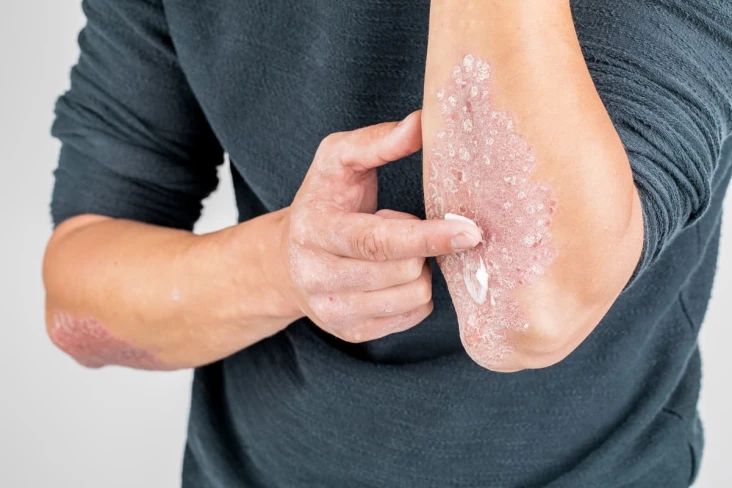Summary
- How to manage psoriasis and its most common consequences
- What is psoriasis
- The sexuality of people with psoriasis
- Psoriasis: among the consequences is erectile dysfunction
- Useful tips for managing psoriasis and its consequences
- Follow your doctor’s advice
- Confront your partner
- Go to therapy
- Avoid tight clothing
- Use lube with condoms
How to manage psoriasis and its most common consequences Psoriasis also has consequences at the level of sexual life
It
can be related to erectile deficit
Let’s try to answer these questions. What is psoriasis
Psoriasis is a chronic skin condition that causes red, scaly patches to form on different parts of the body, such as the knees or elbows. However, psoriasis can also develop in other areas of the body, particularly in the following genital areas:
- penis
- scrotum
- vulva
- vaginal area
- anal area
- area pubica
- upper thighs
Common symptoms are itching, pain, dryness and bleeding and often occur in a cyclical fashion. They can last for weeks, and then fade and recur later.
It is estimated that around the world between 2% and 4% people suffer from psoriasis with consequences that affect their social life of patients, as well as physical and psychological health. The sexuality of people with psoriasis
Psoriasis can affect sexuality in several ways:
- It can generate anxiety and worries about body image. Many people with psoriasis, both men and women, feel self-conscious about their condition and nervousness before facing intimacy. They fear that their partner may not find them attractive or desirable. Partners may also feel anxious, especially if they don’t know much about psoriasis. It should be noted that psoriasis is not contagious and cannot be spread through sexual activity.
- It can involve pain, bleeding and discomfort. Psoriasis can be painful, making intimate contact and rubbing quite uncomfortable. Movement during sex can also cause pain for people with psoriatic arthritis, a related condition.
- It can reduce the desire . People suffering from anxiety and depression due to psoriasis can lose interest in sex. Singles in particular may feel reluctant to go out with someone or have intimate relationships.
Psoriasis: erectile dysfunction among the consequences Erectile dysfunction is
a common problem for men suffering from psoriasis . In fact, it emerged that men affected by this pathology are more likely to suffer from erectile dysfunction. It is no coincidence that patients with psoriasis are recommended to undergo screening for erectile deficit.
The reasons behind the correlation of the two issues are not entirely clear. However, men with psoriasis have been found to have the same comorbidities as erectile dysfunction, such as heart disease, high blood pressure, diabetes and coronary heart disease.
Psoriasis patientsthey can then become anxious about their appearance and also develop low self-esteem – a condition that could negatively interfere with sexual function. Medicines that
treat psoriasis , along with medications that treat accompanying conditions (for example, antidepressants) can also have side effects on the sexual sphere of patients. Useful tips to manage psoriasis and its consequences
Psoriasis does not mean the end of intimacy with the partner. The situation can in fact be managed in the following way: Follow the doctor’s advice
Always take medications, washing the affected areas adequately. If you have any doubts or concerns about the physical appearance, you can contact your doctor for advice or to get clarifications on medications or skin products or to understand how to manage intimacy in the period of exacerbation of psoriasis. Confronting your partner
The discomfort due to psoriasis can be overcome by opening up to your partner, talking about it. Receiving reassurance can help intimacyand it is also advisable to let people know if there are any sexual positions or activities that are problematic due to the rubbing of the area affected by psoriasis. The partner may also have questions about the pathology, for the sake of the couple relationship and it is advisable to talk about it honestly, explaining what it is and giving reassurance that it is not contagious. Going for therapy
Psoriasis can trigger many emotions, such as anxiety, depression and low self-esteem. A mental health professional can be of great help in managing and processing these emotions. Then there are support groups where you can share feelings and experiences with other people who live the same situation. Avoid tight clothing
Not Just Discomfort: Wearing Tight Clothing Can Worsen Symptoms Using Lubricant With Condoms
Some men with genital psoriasis solve their problem by putting lubricant under the condom to reduce irritation.





















































